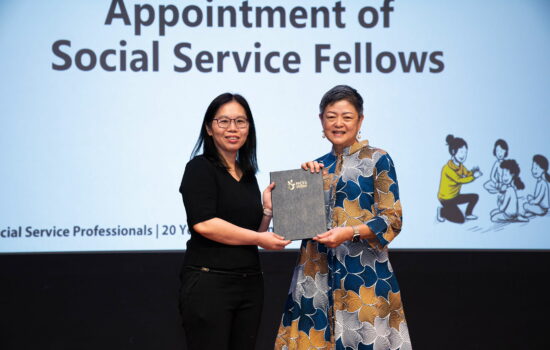Working from dawn to dusk seems to be the daily grind for hawker Mr Chen Mun Wah. A typical day for him begins at 7am as he prepares his stall for business and lasts till 7pm when he calls it a day. Though the work may be tedious, the 44-year-old has never felt that it was a chore. After all, his chicken rice stall at Tanjong Pagar Market is the fruit of his labour after spending about eight years working in a restaurant.

But things took a sharp turn in November last year when Mr Chen experienced a stroke.
The effects of the stroke left him with a reduction in left upper and lower limb co-ordination, as well as weakness in his left arm and leg. As it was difficult for him to complete work tasks using his left hand, he had to rely on his wife and eldest daughter to help run the stall temporarily.
During this time, he enrolled into SPD’s Transition to Employment Programme (TTE) and was eager to begin his therapy sessions so that he could return to work.
His therapists from TTE worked with him on areas such as endurance, co-ordination and motor control training. It was a trying period for Mr Chen as he was overwhelmed with worries about the medical fees and his children’s education expenses due to a loss of income.
While keeping up with his therapy, feelings of guilt also never left him as he witnessed his wife and daughter trying to keep the stall running, working from morning to night.
To help Mr Chen better manage his stress, the social work team provided him with supportive counselling to aid him in processing the emotional complexity and encourage him to remain hopeful and positive. The social workers also helped him to apply for subsidies to reduce his financial burden.
With the unyielding support from his family as well as his own determination to get back to work, Mr Chen remained motivated to do his best in his recovery journey. He started off with receiving therapy sessions twice weekly for two months, before progressing to receiving therapy sessions once a week for a month. His perseverance paid off when he was determined to be ready to transit back to work.

Following his return to work, his care team visited his work site to ensure he was coping well and able to perform his work tasks safely. His social worker also imparted strategies on self-care and stress management to help Mr Chen manage the transition.
Since January this year, Mr Chen has returned to work at his stall. With the support from a good friend cum kitchen assistant who helps him out on a part-time basis, Mr Chen is managing well and is able to work his regular hours. He had two follow up sessions since his return to work in January and was subsequently discharged from TTE.
Thankful that he is able to continue to work after his stroke, Mr Chen hopes to be able to earn enough to support his family and at the same time, prioritise his self-care.
“I’m very grateful for the support and advice given by the TTE team. [To other stroke survivors], keep trying and stay positive. Tomorrow will be a better day,” he said.
This World Stroke Day, we would like to honour the stroke survivors and their caregivers in our midst, who have shown immense grit and resilience in the road to recovery. The journey is undoubtedly challenging – both physically and mentally – but we would like to encourage all to strive on and seek help and support along the way. For more resources catered to stroke survivors and those caring for them, please visit the online portal StrokeHub, hosted by the Health Promotion Board.





